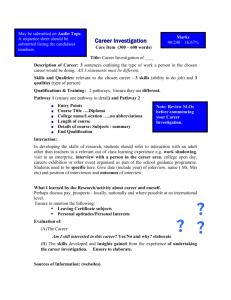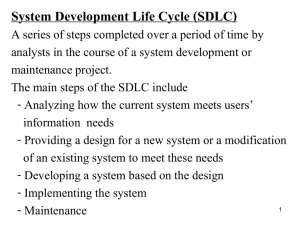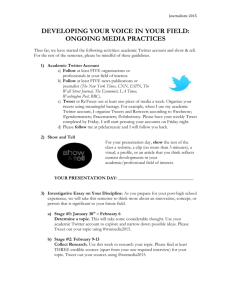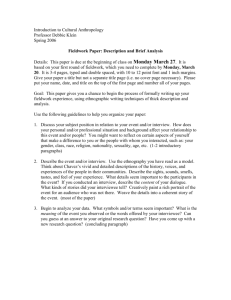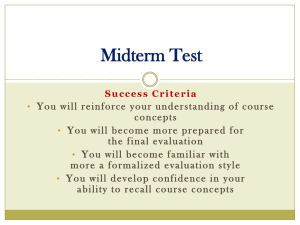In Depth Study
advertisement
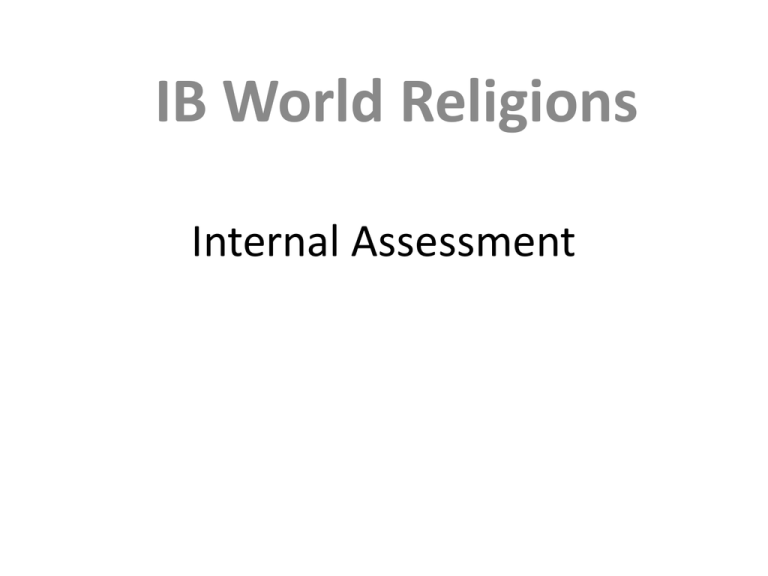
IB World Religions Internal Assessment Purpose of Internal Assessment • Internal assessment is an integral part of the course and is compulsory for all students. It enables them to demonstrate the application of their skills and knowledge, and to pursue their personal interests, without the time limitations and other constraints that are associated with written examinations. • The internal assessment task is integral to the world religions course as a whole and reflects the development of the student throughout the course. • The internal assessment task is a small-scale piece of individual research derived from a combination of personal quest and preliminary reading that requires critical reflection and evaluation. • Students should remember that this investigate study is a major portion of their grade in IB World Religions. Guidance and Authenticity • The internal assessment must be the student’s own work. However, it is not the intention that students should decide upon a title or topic and be left to work on the internal assessment component without any further support from the teacher. • The teacher will play an important role during both the planning stage and the period when the student is working on the internally assessed work. Teachers and students will discuss the internally assessed work. • Students are encouraged to initiate discussions with the teacher to obtain advice and information, and students will not be penalized from seeking guidance. • However, if a student can not complete the work without substantial support from the teacher, this will be recorded on the appropriate form from the Diploma Program. Guidance and Authenticity • It is important that all students understand the basic meaning and significance of concepts that relate to academic honesty, especially authenticity and intellectual property. Student’s internally assessed work must be entirely their own. • As part of the learning process, teachers can give advice to students on a first draft of the internally assessed work. This advice will be in terms of the way the work could be improved, but this first draft will not be heavily annotated or edited by the teacher. The next version handed to the teacher after the first draft must be the final one. • All work submitted to the IB for moderation or assessment will be authenticated by the teacher, and must not include any known instances of suspected or confirmed malpractice. Each student must sign the coversheet for internal assessment to confirm that the work is his or her authentic work and constitutes the final version of that work. Once a student has officially submitted the final version of the work to a teacher for internal assessment, together with the signed coversheet, it cannot be retracted. • Students will need to register for IB World Religions on turnitin.com. An electronic copy of your Rational and Preliminary Research, Plan for Study, Rough Draft and Final Draft need to be turned in to turnitin.com before the due dates. The class ID number is 7188001 and my password is wolfpack (lower case). Group Work • It is acceptable to use a group visit or visiting speaker as part of an individual internal assessment task but it should only be included as part of a larger, individual choice for investigative study. • The investigation and written analysis must be the student’s individual work. Internal Assessment Details Requirements and Recommendations • The internal assessment is an investigative study of an aspect of the religious experience, practice or belief of a group and/or individual adherents. • The focus for the study can be a visit to a sacred place, building or a museum, a study of artifacts, attendance at an act of worship, an interview or interviews with religious adherents, or a study using a range of sources. • However, it is important to emphasize that this is an academic exercise, which requires preliminary research. Relationship to the Syllabus • Any religion can be the focus of the study—it does not have to be taken from the list of the nine world religions in the core syllabus. • Students will be expected to write a focused and precise analysis on the investigative study Word Count • Students must produce a written analysis of 1,500– 1,800 words but no more than 1,800 words. • If the word limit is exceeded, the teacher’s assessment of the work must be based on the first 1,800 words. • Work that exceeds the stated word count will also be penalized under criterion E. • Work that significantly falls beneath the stated range of the word count of the task is likely to receive low marks. • Titles, citations, references and appendices are not included in the word count. References • Students are expected to include a comprehensive list of references that reflects wide preliminary reading. • All sources must be referenced consistently, including interviews, and any referencing system can be used. • Appendices can be used, for example, to present questions asked at interviews. Ethical guidelines • Students should consider whether there are ethical implications involved in visiting a place of religious worship or in interviewing a religious adherent. It is important to show respect for the views and beliefs of others, and the integrity of the information gathered. • It is important that the representation of religions is evidence based, balanced and neutral, as opposed to stereotypical and biased. Generalizations that fail to reflect the internal diversity of belief and practice within major religious traditions should be avoided. • A critical awareness of sources is required, especially media and internet sources, with regard to reliability, accuracy and perspective. In the internal assessment task, the authority and appropriateness to the research project of individual interview subjects must be considered. • Care should be taken not to misrepresent interviewees when using material gained from fieldwork, for example, by quoting them out of context. At the same time material should not be used uncritically. Permissions and confidentiality • Teachers will advise students on the suitability of a research topic and approve all topics. Teachers will advise on protocols that apply to visiting specific religious communities, to participating in, or observing, religious practices, and when speaking with religious representatives. • When conducting fieldwork and using interview material, permission must be gained from interviewees to reproduce that material. Otherwise, sources have to remain anonymous. • All interview participants must be informed of the nature and academic goals of the study in which they are participating and students must guarantee that the interview is confidential Controversial issues • These should not be avoided but require a balanced and informed approach that acknowledges the likely complexity behind them. • Generalizations that represent a whole religious tradition must be avoided, for example, using the term “Muslims” when a particular Muslim group is involved. • Value judgments, such as “these are not true Muslims”, should also be avoided. • There is a clear need to investigate sources and interpretations, and to be critically aware of the complexity of representation. The Investigation • The following stages are necessary in order to carry out the investigation and set the research question. • Preparation—students are expected to have done preliminary research into their chosen topic in order to establish that it will be an appropriate area of investigation. • Expectations/rationale for study—students must have a clear conception of what they expect to find (out) and how they are going to investigate their chosen area. Examples of an investigation 1. 2. 3. 4. 5. 6. Interview with an adherent reflecting on the significance of personal religious experience on their identity and world view. Observation of a religious festival or rite of passage to investigate its purpose and significance. Investigation of different acts of worship performed by two or more different groups within a religion to analyze different perceptions of the purpose of worship. Visit to an art gallery to view depictions of religious narratives. An investigation of a contemporary religious issue or dilemma (such as inter-religious marriage or conversion from one religion to another) through research on the internet, secondary sources and the media. Investigation of radical, liberal, conservative and fundamentalist interpretations of religious traditions through interviews and/or observations of worship, or research on the internet, secondary sources and the media. Examples of Research Questions 1. 2. 3. 4. 5. What is the significance of performing Ramadan for a Muslim? (Interview a Muslim family.) What is the importance of a believer’s baptism to a Baptist? (Visit a Baptist church, observe the rite and interview a Christian Baptist.) What is the significance of any differences in practice between an Orthodox and Reform Jewish Shabbat service? How do these differences relate to belief? (Visit two synagogues, observe the services and interview members of the congregations.) How does an indigenous religion respond to its environment? Examples might be Aboriginals, traditional African religions and Shamanic religions (secondary and primary sources, visits to cultural centers and museums). Analyze how religious beliefs are transmitted through art or architecture by looking at such examples as the Buddha’s enlightenment, the design of a gurdwara, portraits of Jesus’ Crucifixion or Resurrection, or the stainedglass windows in synagogues as compared with churches. The Written Analysis • Written analysis—each student must produce a written analysis (with coversheet stating the title of the investigative study and the word count) under the following five headings: A. – Rationale and preliminary research B. – Plan for study C. – Summary of significant findings D. – Critical reflection and evaluation E. – References. A) Rationale and Preliminary Research Students should: • provide a rationale for the choice of topic for the investigative study • define the focus of the investigative study, which should be formulated as a question • outline and justify the range of sources consulted using full referencing • select and analyze supporting evidence showing how this evidence informs the investigative study. • The rationale should include discussion as to why the topic chosen is of significance as an area of inquiry. The discussion of the preliminary research should include the works you have consulted that will provide the basis of the literature review for your inquiry. These should include a full range of resources including scholarly works and, if appropriate, scripture. B) Plan for study • Students should: • clearly state and narrowly focus the research question • outline the scope and plan for the written analysis • identify the relationship between the research question and the scope and plan. • The plan for study should provide the reader with an account of how you planned your inquiry and give a stepby-step description with a justification for the plan devised. C) Summary of Significant Findings • Students should: • identify and outline significant findings from the investigation through observation, interview, and/or participation and explain the relationship between research findings and the research question • discuss the rationale and plan of study in relationship to the significant research findings. • The summary of significant findings should reflect evidence gathered in the fieldwork and its relationship to the literature reviewed as part of the preliminary research. Thorough referencing to both the fieldwork and the literature should be made by citation to support the findings. D) Critical reflection and evaluation • Students should: • critically reflect on the findings in relation to the question • demonstrate how the investigative study deepens an understanding of religious experiences and/or beliefs • analyze the findings of the preliminary research and assess its usefulness in relation to the significant findings of the investigative study • identify misconceptions and inconsistencies as a result of the research plan and materials used. • understand the degree to which the research was successful in producing significant findings for analysis, and justifying future research. • The critical reflection section needs to show a conceptual awareness of the area of study and how the inquiry undertaken contributes to that. It also needs to present a reflection on how you planned your study, to what extent that was appropriate, how you might now have done it differently and what further questions your findings have raised. E) References and Compliance with Format • Students should: • use material drawn from primary and secondary sources and reference them correctly • comply with the word limit. • Titles, citations/references, bibliography and appendices are not included in the word count. Any system of referencing can be used but it must be consistently used throughout the written analysis. Unacknowledged references may lead to a charge of plagiarism. It is expected that a comprehensive list of references that reflects wide preliminary reading will be presented. • Appendices can be used to present questions asked at interviews, for example. Investigative Study Criteria • The written analysis is assessed against five criteria that are related to the objectives for the world religions course. • Criterion A Rationale and preliminary research 8 points • Criterion B Plan for study 3 points • Criterion C Summary of significant findings 6 points • Criterion D Critical reflection and evaluation 10 points • Criterion E References and compliance with format 3 points Total 30 marks Using Assessment Criteria for Internal Assessment • For internal assessment, a number of assessment criteria have been identified. • Each assessment criterion has level descriptors describing specific levels of achievement together with an appropriate range of marks. • The level descriptors concentrate on positive achievement, although for the lower levels failure to achieve maybe included in the description. Investigative Study Deadlines • • • • • Proposal Rational and preliminary research Plan for study Rough Draft Final Draft November December December February March 5 3 18 6 19
